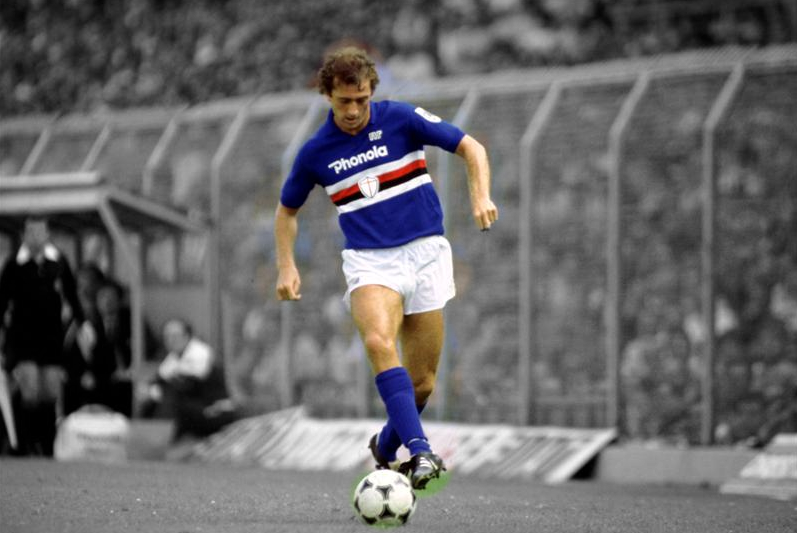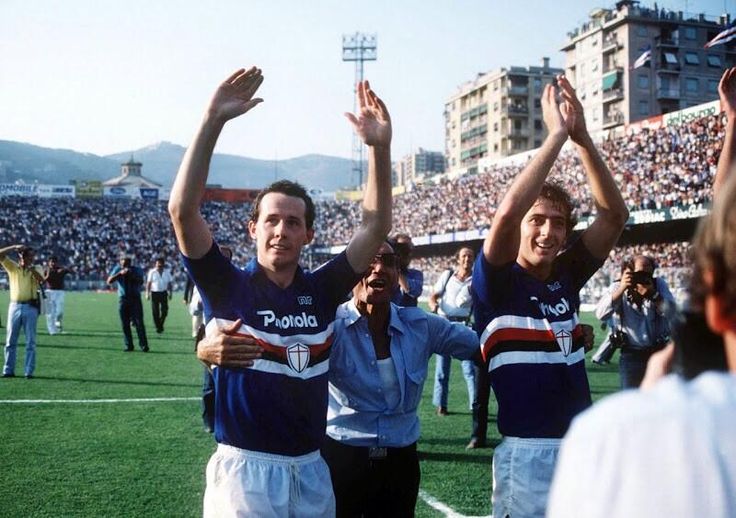“He was the best Englishman to have played in Italy.” Fabio Capello on Trevor Francis.
“I was very pleased to hear this,” Francis admitted, later responding to Capello’s praise. “To receive a compliment from a man of this stature both in England and in Italy fills me with pride.” Indeed it was a grand compliment from one of Italy’s most acclaimed coaches. But what made this Englishman’s career with Sampdoria so impressive?Since bursting onto the scene for Birmingham at the tender age of 16, Francis had become British football’s first million pound man and also scored the winner in Nottingham Forrest’s European Cup final triumph over Malmo in 1979. Three years later, Francis had just finished his first season at a cash-strapped Manchester City and after returning from England’s World Cup campaign, Sampdoria approached the Plymouth born forward. A deal was struck. Francis moved to the Liguria for £700,000 and embarked on his Italian adventure.
Sampdoria had just returned to the big time after enduring a bleak spell in Serie B and their president, Paolo Mantovani, had lofty aspirations. Signing Francis was a statement of intent and with the help of their English acquisition, il Doria made a spectacular start to their 1982-83 Serie A campaign. Samp won their first three games, including home wins against a Juventus side that boasted Michel Platini, Paolo Rossi and Gaetano Scirea, a Roma team whose midfield was governed by legendary Brazilian,Falcao, and a win at the Stadio San Siro against Inter. The victories sent shockwaves across Italy and in the Blucerchiati’s triumph over the Nerazzurri, Francis made ripples of his own.
After just 11 minutes, with the game tied at 0-0, the Englishman set off from his own half, eating up ground and gliding effortlessly past the one Inter defender that dared to stop him. Having reached the edge of the penalty area, he exchanged a one-two with a baby-faced Roberto Mancini and fired his shot – off balance – into the bottom corner. It was a magisterial start and his side went on to win the game 2-1 thanks to a splendid Mancini volley.
The Birmingham youth product quickly became accustomed to the mores of Italian life and this was, in part, thanks to fellow English speaker Liam Brady.
It was reassuring to have somebody there who could speak English,” Francis later reflected. “Having already been there in Italy with Juventus, Liam Brady could speak Italian which was also helpful.
However, during Samp’s third successive victory over Roma, Francis’ ebullient start to life on the peninsula was unceremoniously halted by a rumbustious tackle from defender Pietro Vierchowod. Renowned for his rugged approach, the Italian’s challenge kept Francis side-lined for several weeks and it was perhaps no coincidence that his side’s astonishing form tailed off. The Englishman’s injury hampered his progress for the rest of the season and Il Doria eventually finished in seventh place.
Liam Brady (left) and Francis were two of Samp’s star players during the mid-1980s’
The following campaign, Francis returned with a bang, producing one of the performances of the season away at Inter, a side that must have been sick of the sight of him. With the Nerazzurri leading 1-0, Samp’s number 9 took matters into his own hands and scored two second-half goals to earn his side another famous victory. While his first goal had all the hallmarks of a deadly finisher, the second was virtuoso and truly world class. Watching the goal, the similarity to Michael Owen’s for England against Argentina in World Cup 1998 is striking. Francis’ turn of pace to burst past two defenders was electric, and his left foot finish into the top-right corner unerring. The performance even moved Inter’s legendary shot-stopper, Walter Zenga, to hyperbolic praise, claiming: “Francis is the best forward I’ve ever seen.”
By the 1984-85 campaign, Francis had been joined by fellow Brit Graeme Souness in a Blucerchiati squad which possessed the likes of Gianluca Vialli, Mancini and ironically, Francis’ old nemesis, Pietro Vierchowod. The Doriani bared the fruits of this talented crop, and in 1985, they secured their first trophy of the Mantovani era, winning the Coppa Italia. Yet Francis’ lack of fitness came back to haunt him as he missed out on playing in the final.
Unfortunately for the former Notts Forrest man, this proved to be a leitmotif throughout his Italian career. According to journalist Piero Sessarego, Francis suffered from hyperuricemia, an excess of uric acid in the blood which weakened his muscle fibres. Some also suggested that Francis may not have helped himself by indulging in some of life’s guilty pleasures; a love for excessive drink and food being among his alleged pecadillos.
Unfortunately, there was no panacea for his muscular problems and Francis eventually left Samp in 1986 to join Atalanta. In truth, this signalled the end of his time in Italy, and after an indifferent year in Lombardy – where he registered just one goal in 21 appearances – the Englishman joined Rangers to player under his former teammate Souness.
Despite the injuries, Francis and Sampdoria remember each other with equal fondness. In 68 appearances for the club, he registered 17 goals and his exploits have not been forgotten. In November 2012, Francis was Sampdoria’s guest of honour for the Derby della Lanterna against Genoa, a privilege he was proud to be awarded. “It was marvellous to go back and see so many old friends,” Francis said of his return. “I was greatly appreciated by the supporters and they gave me a warm welcome.”
And is it any wonder. Francis was an intelligent forward. His movement was intuitive and pace blistering. This, combined with an adroit touch and veritable elegance, made him a genuine entertainer. This is what distinguished him. During the mid-1980s’, Serie A was renowned for resolute and uncompromising defenders, but he had the ability to embarrass the very best of them. Just ask Walter Zenga and Fabio Capello.
Words by Luca Hodges-Ramon: @LH_Ramon25
‘Luca is co-editor of The Gentleman Ultra and has recently completed his Masters in Political Sociology. His research interests lie in the intersection of football, socio-politics and history.’



So sad that today news reaches us that he had passed away.